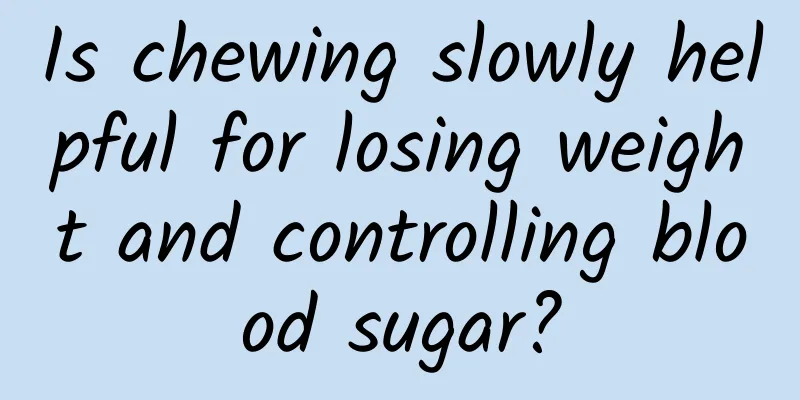Is chewing slowly helpful for losing weight and controlling blood sugar?

|
Recent scientific news mentioned the results of a study, saying that chewing food more times can increase the thermal effect of food, which is equivalent to reducing the calories of food (Hamada Y, 2021). Let's first learn about the "diet-induced therogenesis" (DIT). Simply put, the amount of heat dissipated by the body after eating will increase compared to before eating. This effect makes people feel warmer after a meal. Many people have this experience in winter: before a meal, they feel very cold when they are hungry, but after a full meal, their bodies are warm and they are not afraid of the cold. To put it another way, the existence of the thermal effect of food means that part of the calories from the food you eat are dissipated as heat, and this part can no longer be used to grow fat. (A small part of the food heat just slips away from the surface of the skin and miraculously dissipates into the atmosphere...) This study was done using the same liquid diet. There were three treatments: Drink it straight away; Taste before you drink it; Chew the drink before tasting it. This design is to avoid the influence of solid food content on chewing effect. In other words, it is purely to explore whether chewing has an effect on the thermal effect of food. I will not describe the specific method in detail. The references are at the back and can be found directly on the Internet. Some friends may be very happy: it seems that eating high-calorie food, as long as you chew more, you can eat it without worry! Don't be too happy too soon. Because compared with the calories consumed by chewing more, the increase in food calories when you eat a few more bites will be far greater than the calories consumed by chewing. The daily energy intake standard for an adult woman who does light physical activity is 1,800 kcal, and a regular meal is at least 600 kcal. Researchers' calculations show that for a regular meal of more than 600 kcal, chewing more can only consume a dozen more kcal, which is really negligible... However, this doesn't mean there's no point in chewing more. In fact, there have been many studies on the beneficial effects of increased chewing. It is certain that for the same amount of food, when the number of chewings is increased intentionally, appetite can be reduced and overeating can be avoided. Some studies suggest that this strategy of chewing more may be particularly effective for obese people and those who have difficulty controlling their food intake. The so-called chewing more has two meanings: one is to chew more of the same food, and the other is to eat more food that needs to be chewed. Both are meaningful. For the same kind of food, if you chew it more carefully, it will not only help digestion but also make it easier to control appetite. Oral processing is the beginning of the digestive process. Food is chewed and mixed with saliva to form a bolus. Saliva contains a small amount of enzymes, especially salivary amylase, which can digest starch in a small amount. The stomach contains pepsin, which acts on fish, meat and eggs to release a small amount of amino acids and small peptides. Therefore, chewing food finely will make it easier to produce "early digestion products". These small molecules will "tell" the body what has been eaten, so that the body can release relevant digestive juices more specifically and notify various organs to prepare to process the corresponding food ingredients, making digestion and absorption smoother. From the perspective of metabolic feedback regulation, some "early digestion products", such as a small amount of reducing sugars and amino acids, will induce the production of gastrointestinal hormones related to satiety, making it easier for people to feel full. Chewing more times and extending the time of eating can also give the brain more opportunities to understand how much you have eaten. Otherwise, if you eat too fast, the brain will not have time to fully feel full, and you will have already taken in too much food. It will be too late to stop eating until the "physical receptors" in the gastrointestinal tract feel bloated. Chewing more can also help people better appreciate the deliciousness of the food itself, without the need for so many salty and sweet seasonings. The more you chew rice and steamed buns, the sweeter they become. Plain vegetables also have a refreshing sweet fragrance when you chew them carefully. Generally speaking, fast food is very salty because when chewing and swallowing quickly, the taste buds do not have time to appreciate the original flavor of the food, nor do they have time to fully appreciate the salty taste, so the taste must be heavily seasoned to taste good. These are all things that are good for your health. On the other hand, eating foods that require proper chewing can better curb overeating and help prevent obesity. If you choose foods that require chewing before swallowing, you don't need to deliberately control the number of times you chew. You just need to choose the right food and you will naturally slow down your eating speed. I remember that I once did a program on TV to discuss the issue of eating speed. I asked the audience, who eats very fast on a daily basis? Three audience members stood up and said that they really eat very fast and finish a meal in just a few minutes. I first gave each of them a piece of soft staple bread, and the fastest person swallowed it within 10 seconds. Then, I gave each of them a Fuji apple, and their eating speed dropped significantly, because they couldn't swallow the apple without chewing it well. The fastest person took nearly two minutes to chew it. I said: This piece of staple bread and this big apple have similar calories, but the speed of eating is completely different because of the different chewing properties. The things that are most likely to make people gain weight are those that are particularly easy to chew, particularly easy to swallow, and can be eaten quickly. Think back, what are biscuits, cakes, mousse, bread, custard buns... Which one is chewy? The things that carbohydrate lovers like, the foods that can be overeaten, are all foods that can be swallowed quickly. On the other hand, foods that require more chewing are often not easy for people to eat more. For example, raw carrots, broccoli, green vegetables, oatmeal, etc. Compared with white rice, brown rice such as black rice and red rice obviously requires more chewing before swallowing. They are both meat, but which one is easier to eat, the soft and juicy meat with fat seeping into the meat, or the lean meat that needs to be chewed hard? Think about the taste of pork belly, spare ribs, and fat sheep and beef, and then think about the taste of chicken breast and beef shank... However, the effect of chewing more on post-meal blood sugar is uncertain. Most studies have not found that chewing more can reduce post-meal blood sugar. Even for carbohydrate foods, chewing more may increase blood sugar variability in the early stages of digestion, causing blood sugar to rise slightly earlier and fall slightly earlier. People can understand that after chewing, the food particles become smaller, easier to digest, and more fully acted upon by salivary amylase, so the blood sugar content of carbohydrates should rise faster. But experiments in healthy subjects have shown that if the area under the blood glucose curve is calculated, there is not much difference between carbohydrate foods of different chewability, such as rice and rice cakes. Some people may be a little disappointed. It turns out that chewing food slowly and thoroughly can't reduce blood sugar response? In fact, there is no need to be disappointed. These research results at least show that chewing more will not increase your blood sugar response. Therefore, diabetics can also chew food carefully and don't have to swallow it whole to control blood sugar. In short, chewing slowly and slowing down the speed of eating can not only make people appreciate the taste of food better, but also help people control their appetite and reduce the need for salt and sugar seasonings. Choosing foods that need to be chewed can also help people better control their food intake. It is correct to conclude that chewing food carefully is good for your health and helps prevent obesity. References: 1 Hamada Y & Hayashi N. Chewing increases postprandial diet-induced thermogenesis. Scientific Reports, 2021, 11:23714 2 Tonni I, Ricciardi G, Piancino MG. The influence of food hardness on the physiological parameters of mastication: A systematic review. Archives of Oral Biology, 2020, 3 Campbell CL, Wagoner TB, Foegeding EA. Designing foods for satiety: The roles of food structure and oral processing in satiation and satiety. Food Structure, |
Recommend
Behind the prosperity of domestic mobile phone manufacturers is actually a bleak situation
In 2015 and 2016, the development of domestic mob...
Why do users pay you?
When we are doing event planning and product sale...
When will the Shulan epidemic in Jilin be lifted in 2022? When will express delivery resume? Attached is the latest news!
Shulan City is located in the center of the North...
A comprehensive summary of Android application publishing platforms!
During the development process, you may encounter...
Safety first, prevention before it happens: Do you understand these disinfection precautions?
Recently, whether working from home or returning ...
Brand Marketing and Promotion丨What’s wrong with Durex’s Mother’s Day poster?
Ever since the poster copywriting failures of Dur...
2019 Wedding Photo Industry User Insight Report!
The core findings of the 2019 Wedding Photography...
How UGC establishes content order!
I have said before that we should consider the lo...
How to build an event operation and promotion framework in 4 steps?
We often see various commercial activities: Tmall...
Microsoft brings Android Wear apps to Android phones
If you want to know what it's like to use And...
How do new brands start from 0 to 1?
I feel that PMPM has been quite popular recently,...
2022 Qingming Festival holiday arrangements: How many days are there? How to adjust the rest time? The latest official notification is here!
In half a month it will be Qingming Festival. my c...
Crab Boss's Super Strategy for Douyin Live Streaming Sales: Detailed gameplay of Douyin live streaming sales, small store operation, paid delivery, etc.
Tik Tok live streaming advanced course, start fro...
How much does it cost to create a ticketing mini program in Pingdingshan?
According to industry insiders, mini programs wil...

![Wall Street Academy "Analysis of the Key Points of Investment Research and Analysis Practice" Investment Research and Analysis Practical Skills [MP4/PDF/1.17GB]](/upload/images/67cc26e0e8154.webp)







